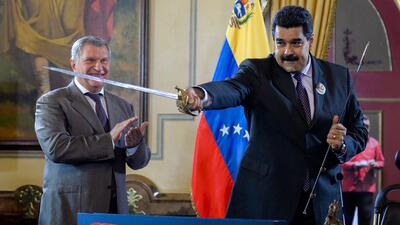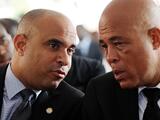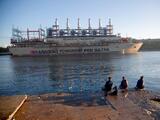Putin’s Venezuela gamble to ‘Make Russia Great Again’
Lea este articulo en español

In the midst of an aborted uprising in Venezuela late last month, U.S. Secretary of State Mike Pompeo claimed that the country’s embattled leader, Nicolas Maduro, was preparing to leave the country for Cuba, but was talked out of it by Russia.
"He had an airplane on the tarmac, he was ready to leave … as we understand it and the Russians indicated he should stay." Pompeo said in an interview with CNN.
Pompeo’s offered no evidence, but his comments, along with the recent arrival in Venezuela of 100 Russian troops and two military planes, served to cement a narrative that Moscow was firmly behind Maduro and had become a major obstacle to international efforts to restore democracy in Venezuela. But some Venezuela experts question whether Russia is truly committed to defending Maduro, and is instead playing a clever game designed to protect its oil investments in Venezuela while posing as a global player in the U.S.’s backyard.
“I think we have seen some subtle, but clear, messaging that Moscow would be open to a potential alternative path forward for Venezuela, although it cannot be seen to outright abandon the Maduro regime,” said Maximilian Hess, an analyst at AKE International, a political risk and security consulting firm in London.
“Russia’s interests in Venezuela are the result of a decade-long effort to secure oil deals and extract rents. The geopolitics are a nice cherry, but little more,” he added.
Public expressions of U.S. concern about Moscow’s intentions went as far as declarations by top Trump administration officials invoking the infamous Monroe Doctrine, a 19 thcentury U.S. policy opposing foreign meddling in its hemisphere. “The destinies of our nations will not be dictated by foreign powers; they will be shaped by the people who call this Hemisphere home. Today, we proudly proclaim for all to hear: the Monroe Doctrine is alive and well,” U.S. National Security Director, John Bolton, told Univision in an interview last month.
Phone calls
In recent weeks alone, U.S. and Russian officials have had several meetings and phone calls in which the subject of Venezuela has come up. Pompeo traded accusations with Russian Foreign Minister Sergei Lavrov in a May phone call, but cooler heads prevailed when they met earlier this week in Sochi where they more politely agreed to disagree. Sandwiched in between, Trump also had a lengthy phone call with Vladimir Putin in which the U.S. president said he was assured that Russia “is not looking at all to get involved in Venezuela.”
“That’s what Moscow wants. They look like they are going toe-to-toe with the United States,” said Russ Dalen, managing director of Caracas Capital, a Venezuela-based boutique investment bank, who closely tracks the oil industry. “They get a lot of bang for very little buck. For them it’s back to the glory days of the Cold War, so Putin can make his own red hat: ‘Make Russia Great Again.’”
However, most analysts say the idea that Russia is seeking to establish a new beachhead in Venezuela to advance its geopolitical interests is a misreading of its economic interests, and its global reach. “They are basically playing a game to create leverage where none existed,” said Fernando Cutz, former director for South America at the National Security Council, which advises the White House on foreign policy. “Until six month ago they were irrelevant. Then, after the Trump administration decided to try and remove Maduro they saw an opportunity. They sent in a few troops and made themselves relevant. It’s a master move,” he added.
War planes and loans
Russia grabbed media attention in December last year, when two Russian strategic bomber aircraft capable of carrying nuclear weapons landed in Venezuela. In late March, two military planes carrying about 100 more Russian personnel arrived in Caracas.
In fact, the Russia-Venezuela relationship has seen better days. Economic ties, including large loans, oil and gas investments and arms deals have shrunk in recent years as the country has slipped into chaos and corruption.
It’s recent deployments of troops and planes have more to do with protecting its oil interests. “ They haven’t put new money into Venezuela for a long time,” said Hess.
Russia’s state-run oil giant, Rosneft, has made at least $17 billion in loans and credit lines since 2006, according to Reuters, mostly in advance payments for Venezuelan crude supplies. Rosneft also holds a 49.9 percent stake in U.S. refiner Citgo for a 2016 loan of about $1.5 billion.
Some of those loans were to buy Russian-made Kalashnikov rifles, Sukhoi planes, tanks and other military equipment. Rosneft, whose chief executive Igor Sechin has made several visits to Venezuela, has stakes in a number of oil projects in the country. So far, while defaulting on $25 billion owed to bondholders, Venezuela has made good on its payments to Russia, including a recent $500 million announced this week, which brought its debt down to $1.8 billion. At the current rate the loan could be repaid in full next year.
Possible deal?
In that case, would Russia be open to a deal to remove Maduro? Some experts say it’s not implausible, but it remains unclear what the U.S. can offer Russia. Putin’s bold moves in Venezuela are seen by some as a tit-for-tat for U.S. support for Ukraine – and sanctions against Russia after its annexation of the Crimea in 2014. “They would bite that deal off in a milli-second,” said Hess, referring to an agreement by the U.S. to list sanctions of walk away from Ukraine.
In a conference call this week, Rosneft Vice President Didier Casemiro said that the U.S. had given permission for Rosneft to use Venezuelan oil to supply a large refinery it owns in India. “It was a very interesting comment and the first time we've heard of such U.S. approval,” said Hess. Univision requested a comment from the State Department on Thursday but received no immediate answer.
But, despite Trump’s apparent 'bromance' with Putin, that’s not something the White House is likely to do, experts say, as it would be giving away too much, and signal U.S. weakness. “Why would we back off from a fake situation the Russians have created in Venezuela?” asked Cutz, adding that the accounts by Pompeo and Bolton about Moscow’s influence over Maduro’s fate may be overblown.
“I’m not even sure if they (Russia) wanted to collaborate with us that there is really a whole lot they could do,” he said.
To be sure, Russia lacks the means for its planes and warships to establish a significant presence in Venezuela. For example, in late March, Russia sought to dock a large warship in Malta that officials told BuzzFeed News was bound for Venezuela. Russian diplomats were reportedly trying to purchase riot gear and gas canisters on the island, which officials suspect they wanted to load onto the ship. That came days after Malta, a member of the European Union, denied Russia permission to use its airspace to fly military aircraft to Venezuela from Syria.
"They don’t have the capacity to re-fuel their planes, or re-supply their ships,” said Dallen. “That shows they really are not a global player. They couldn’t really get in a scrimmage with us over Venezuela, even if they wanted to.”
Cutz and others say Cuba and China would appear to hold more sway. Cuba is estimated to have a significant security presence, helping Maduro with counter-intelligence against the opposition and disloyalty in his military ranks, while China is owed $20 billion in debts and has a major stake in the oil and gas industry.
Relacionados
Cuba's "army" in Venezuela: doctors or soldiers?
Maduro underestimated?
Indeed, as U.S. officials have repeatedly stated, Maduro’s regime has morphed into a kleptocracy that is sustained by massive public corruption and trafficking of Colombian cocaine. “They don’t need a whole lot of outside help,” said Cutz.
Just as U.S. officials may have over-estimate the Russian role, experts warn that it’s a mistake to underestimate Maduro’s staying power.
The Trump administration-imposed sanctions on Venezuelan oil shipments in late January including a ban on all dollar transactions with its state oil company PDVSA. The sanctions were originally designed to choke the economy and bring it to its knees in three to four months, said Cutz, who helped write them before he left the NSC last year. “We are beyond that. How are they still keeping the money flowing?” he asked, suggesting that the U.S. may also have underestimated the scale of the illicit economy – drugs and mining of gold and other precious minerals.
Ironically, Russia has increased its shipments of oil to the U.S. in recent weeks, profiting from the shortfall in U.S. imports left by the Venezuelan sanctions. “Russian shipments coming to the U.S. seem to be on steroids,” said Dallen. For example, in the first half of this month, 13 ships from Russia have arrived in the U.S. bringing almost 5 million barrels of crude oil and oil product -- with more ships on the way,” he added, more than doubling, on its way to tripling, the monthly amount of crude oil Moscow sent to the U.S. last year.
“It’s clear they do want to have a seat at the table in the Monroe Doctrine era,” said Hess. While Moscow may not be willing yet to throw Maduro under the bus a deal may still be possible, as the recent flurry of phone calls and meetings suggests. “These things are being kept very close. Even the fact that they are having talks is a win for Russia. The Russians just have to get something that makes them look good,” Hess added.
In that case Moscow may be putting the finishing touches to one of its mansions in the plush Barvikha suburb outside Moscow, the health resort of the President of Russia, popular with wealthy Russians and some undesirable former foreign leaders, according to The New York Times, including the wife and family members of Slobodan Milosevic, the disgraced former president of Serbia.



